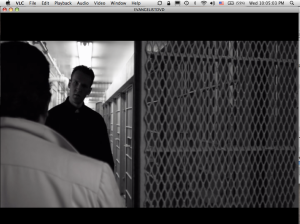Irrational nostalgia: as it relates to our love of the theater experience
June 25, 2010 2 Comments
Our prospective web premiere has caused me to reflect on the theater experience. What is the value of going to the movies? For a while, I’ve maintained a position that it is the best way to watch a film. But I am unsure if this feeling is an actual conviction, or if really I just cling to an irrational romantic notion of “the idea” of the movie theater.
Let’s examine the theater going experience. How does it differ from watching a movie at home? To start, there’s the larger screen. To this I have two points. First of all, many homes are becoming furnished with projectors that enable the theater viewing experience on your wall. As projectors proliferate, many people will forgo televisions for digital projectors. They take up less space and provide a larger image. I have already enjoyed many movies this way, so I no longer see the movies as the exclusive provider of a large screen.
Secondly, does a larger image actually equal a better experience? I admit that seeing “Lawrence of Arabia” at the Ziegfeld is an experience I will cherish for the rest of my life. But in the same way that certain paintings are better with small dimensions, couldn’t I argue that some movies benefit from a small dimension? If the film’s goal is to sweep the viewer into an atmosphere and make him forget about the real world, then a large screen is probably a better route. But, if sweeping the viewer up in the world of the film might be disadvantageous, say because it prevents the viewer from examining the ideas of the film, then I would argue that film should be viewed on a smaller screen. Given these two points, I think we cannot be dogmatic about a movie theater’s screen size advantage.
Neither can we point to the fact that theaters offer the most current releases. Comcast is in the process of making deals with studios to acquire the movies on cable even sooner. The gap between theatrical and cable release will diminish to nothing. In fact, some movies are already being released simultaneously on cable networks and theater screens.
Could the theater going experience offer anything else? Well, there’s overpriced snacks. Sneaking snacks into a theater is a bitter reminder that I am poor. Not such a good context to begin a film viewing experience. At home, I can publicly display any type of cuisine, which has the potential to be much more diverse than what the theater offers.
Is there an advantage to watching a movie with strangers? There is something to be said for the ferver of a crowd, especially at midnight screenings, film festivals, or fan saturated retrospectives. And there’s something to be said for chatting up with a fellow fan (although I rarely do this). But a factor like this is technically external to the film, no? I could argue that if it does significantly affect my appreciation of the film, then the audience is potentially distorting my experience of the film. To take the argument to extreme lengths, if I make out with a girl for the duration of Jonah Hex, is it suddenly a good film? No, and I shouldn’t allow the energy of the audience to influence my assessment of a movie either.
There’s also the matter of having to go to the theater, and make it at a time established by the theater. Now, I actually see this as an advantage. When you have to look up the show times, coordinate with other people, make the trip to the theater, it creates the context of an “EVENT” for the movie watching experience. It’s special. It’s not mundane like just flicking on the television. But I have created this event experience through movie marathons right on the comfort of my own couch, and these experiences rival any event I’ve had at the theater.
So then, what is left? As with any obsolete technology, there is one remaining thread sustaining it’s influence in the lives of human beings. Nostalgia. Does the theater retain value because when I go there, I am reminded of the great tradition that was part of so many people’s lives?
Here’s one thing to consider. Many theater goers of the 50s were not clinging to the movie theaters because they loved the movie theaters. No, they went to the movie theaters because it was modern technology. So if we really want to adopt the mindset of these people, we would also turn to the modern technology instead of clinging to old fashioned, outdated experiences.
But here is the heart of the issue. Why do I like an old bicycle? Because it has a history? It has endured time? These are all admirable qualities, but have nothing to do with my speed or safety. If I like an old bicycle, it’s because I like being perceived as the type of person who likes old bicycles. I have accepted this taste as part of my identity. I like to be perceived as a simple european instead of an exercise addicted Lance Armstrong. Similarly, if I like the theater going experience, it is because I like the idea of being perceived as the type of person who likes the theater going experience. Who sees charm in the dingy art houses. That constructs a romantic identity for me and because of this, my appreciation for the theater going experience is really just a narcissistic notion.
So the bottom line is that I cannot think of one legitimate reason to embrace the theater going experience, but I can think of many reasons not to. If you can think of a good reason, send it to me.



